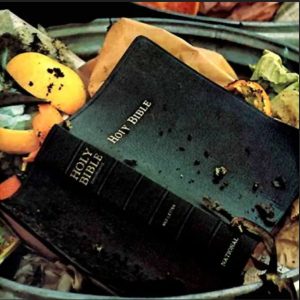I rather thoughtlessly quoted the bible when I was talking to my friend about being gay. She has partially  emerged from her closet—which is a fraught enterprise for her because of her religious background—and we were discussing the tendency of bible people to judge. Once she came out as gay they began to make their judgmental pronouncements. To suggest an oft-used biblical way to combat that mentality, I repeated once again the edict against judgments: Matthew 7:1 “Judge not or ye be not judged.”
emerged from her closet—which is a fraught enterprise for her because of her religious background—and we were discussing the tendency of bible people to judge. Once she came out as gay they began to make their judgmental pronouncements. To suggest an oft-used biblical way to combat that mentality, I repeated once again the edict against judgments: Matthew 7:1 “Judge not or ye be not judged.”
I’d been careless about the quote before, especially when talking to particularly judgemental bible pounders, but for the first time—as I talked to my friend—I realized that the two parts of the quote were mutually incompatible. Not only was it far more focused on the second half of the sentence than the first,, but it wasn’t the interdiction against judgement that it pretended to be. Rather than instruct  people not to judge, which was the way that I’d always used it, it was rather a hypocritical celebration of judgement and a threat of punishment. It wasn’t trying to encourage us to be good people, or to modify our behaviour as moral beings, but rather because god will judge us unfit and condemn us to eternal punishment.
people not to judge, which was the way that I’d always used it, it was rather a hypocritical celebration of judgement and a threat of punishment. It wasn’t trying to encourage us to be good people, or to modify our behaviour as moral beings, but rather because god will judge us unfit and condemn us to eternal punishment.
This mentality will come as no surprise to anyone who knows such religious texts, for they are much more about fear and punishment than they are entreaties to be moral. In fact, their notion of morality is entirely about a prurient delight in what happens to those who get caught—think of all those who enjoy the idea of hellfire for others—rather than the effect of the bad behaviour or how it might affect the actor or others. Naïvely, I’d never noticed the expression that had tripped off my tongue a hundred times was actually just as morally bankrupt as the rest of the book. The passage  goes on to be much more explicit: “For with what judgment ye judge, ye shall be judged: and with what measure ye mete, it shall be measured to you again.” Rather than a moral caution, the quote doesn’t even reference some notion of the greatest good from Jeremy Bentham, or the Buddhist idea that good deeds makes the person. Instead, the passage begins to revel in what will happen to someone who doesn’t follow the rule.
goes on to be much more explicit: “For with what judgment ye judge, ye shall be judged: and with what measure ye mete, it shall be measured to you again.” Rather than a moral caution, the quote doesn’t even reference some notion of the greatest good from Jeremy Bentham, or the Buddhist idea that good deeds makes the person. Instead, the passage begins to revel in what will happen to someone who doesn’t follow the rule.
The bible people will immediately claim that god is allowed to judge, and therefore the quote is not hypocritical at all. They would argue, although not explicitly, that judgement itself is not the problem, but rather who is doing the judging. Such moral slipperiness opens itself up to all sorts of abuses, however. Even in the world of the writers,  caught between the daily grind of taxpaying and goat herding, there would have been those who would take advantage of the idea that judgement is fine for some.
caught between the daily grind of taxpaying and goat herding, there would have been those who would take advantage of the idea that judgement is fine for some.
If I think that I am better than another—as is all too common with bigots of all stripes—then there is nothing that expressly forbids me from judging him or her. It only prevents judgement between equals, and it is a rare person who can’t imagine themselves as superior to another as they embrace the legalistic wiggle room the rule allows.
As soon as I quoted the phrase to my friend, and claimed it forbade judging, I heard what it really meant for the first time. I heard the evil unction implied by the statement. I immediately  advised her to cut out the second half, which was entirely about judging and therefore undermined the moral authority of the first half. Instead, I would shorten the quote to “Judge not,” and advise throwing the rest of the book away.
advised her to cut out the second half, which was entirely about judging and therefore undermined the moral authority of the first half. Instead, I would shorten the quote to “Judge not,” and advise throwing the rest of the book away.
